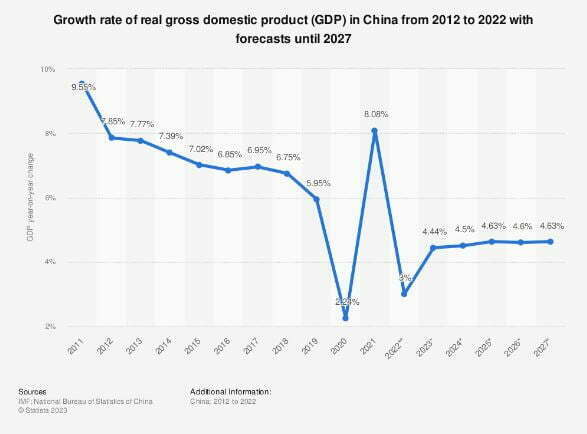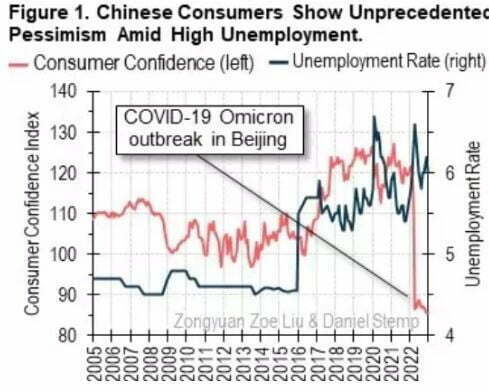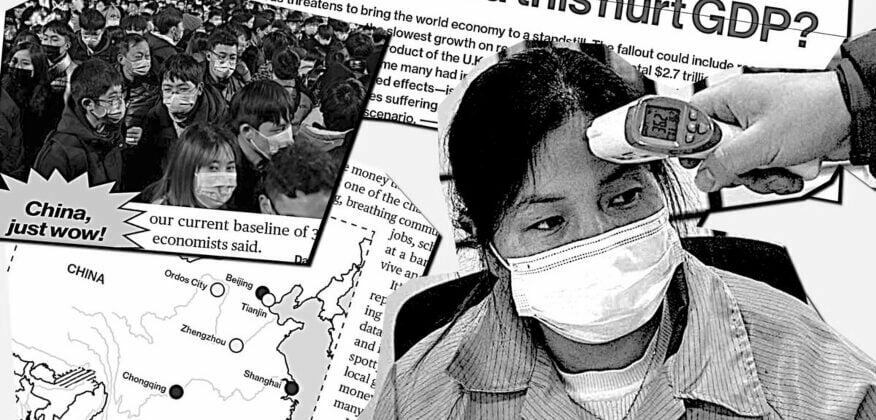The Chinese have been at both ends of the spectrum regarding the manner in which the country is handling its Covid epidemic.
On one end, you had total lockdown, while on the other, you have an open society with little effective vaccine utilizing the herd mentality.
While the latter style is currently in effect, the lockdown has caused significant damage internally to China and the U.S., and the world as a whole.
In 2023, China’s economic recovery will depend on the ability of the government to stimulate domestic consumption and on the resilience of Chinese households. While GDP numbers still hover in the 4% range, they are down considerably from pre-pandemic levels.

China’s Covid policy will have a significant impact on the U.S. economy this year. China is a major supplier of goods to the U.S., and if the country experiences disruptions in its production due to Covid measures, this could lead to supply chain disruptions and increased prices for U.S. consumers. Additionally, if China’s economy slows down due to the nationwide pandemic lockdowns, it could affect U.S. companies that export goods to China, leading to lower revenue and profits.
In regard to the supply chain, China’s Covid policy could cause significant global disruptions, and as we know, China is a major manufacturer and supplier of goods to many countries, including the U.S. If production in China slows down or comes to a halt due to further lockdowns measures, it could lead to shortages of goods and increased prices for consumers.
This could particularly impact industries such as electronics, pharmaceuticals, and automobiles, which rely heavily on China for parts and components.
China’s Covid policy could also affect American companies that export goods to China. If China experiences further economic slowdown due to the pandemic policies, it could lead to a decrease in demand for U.S. goods, reducing revenue and profits for U.S. multinational companies.
Additionally, if trade relations between the U.S. and China worsen due to the pandemic policies, it could further reduce exports from the U.S. to China. The relationship with China is currently tenuous on several fronts. Its Covid policy could also affect the already strained US-China trade relations.
If China’s lockdown proves severe enough, it could lead to trade restrictions or even a full-blown trade war between the two countries. Furthermore, if China decides to prioritize its domestic economy over international trade, it could reduce imports from the U.S. and potentially hurt American businesses.
You may find it hard to fathom that your generic prescription is made in China. Those of us who rely on medicine doesn’t always rest as easily as we should with this in mind.
China’s Covid policy will have a significant impact on global health this year. In addition to your prescription, China is also a major contributor to the global effort to produce and distribute Covid vaccines. If the country experiences disruptions due to post-pandemic issues, it could impact the global supply of vaccines and slow down the rollout of immunization programs.
Also, if China experiences another severe outbreak, it could lead to the spread of new Covid variants, which could impact the global effort to control the pandemic. This is actually all the more likely with their herd mentality in place.
When China released its economic data for 2022, it revealed that its GDP had grown by only 3% compared to the government’s 5.5% forecast. Coupled with high domestic unemployment, the lockdown effects have dramatically altered the way of life for the Chinese people.

China is the second largest economy in the world, and its decision to lockdown has severely slowed the global growth engine.
According to Dane Chamorro, Control Risks head of Global Risk Analysis and Business Intelligence practice in the Americas, “China is absolutely key for global growth. It’s a huge share, anywhere between 25% to 35% of global growth, economic growth. So if you think about it this way, when the Chinese economy shrinks 1%, the global economy shrinks about half a percent.”
The political tensions between the U.S. and China may end up being what ultimately undoes economic relations. What for decades was a quasi-capitalist communist economy has become much more state-controlled. This move towards a more Maoist-type economy will ultimately pressure the people of China.
According to a 2021 report by CCTV, about 40 percent of single people in China’s first-tier cities live mostly paycheck to check. That might not be all that bad, comparably. The share of Americans living paycheck to paycheck rose to 63% last year.
Nothing is easy.











